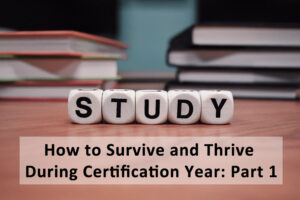Moving is stressful. Moving for fellowship/subspecialty training-related work has a few extra bits thrown on top. And hopefully anyone reading this post for guidance will not be finding themselves moving through a pandemic, but just in case, I have thrown that bit in at the end as well 🙂
This post is based on my recent June 2020 experience and is not an exhaustive list. More additions are welcome!
Moving for Work
- Apply for provincial license 3 months ahead of time – yes, during Royal College exam time or Family Medicine Certification Exam time if that is how the timelines work out (e.g. for fellowships, further subspecialty resident training, or staff physician jobs). The licensing machinery can be slooooooow. And this can be a hefty package of paperwork, along with tracking down all sorts of other documents. I had to get my medical school transcripts during the pandemic, when all the offices were closed and people were working remotely. And then it took forever to get to the provincial licensing authority, who mentioned that processing paperwork would be delayed as most personnel were working remotely. Stressful times.

- Change CMPA coverage at least 2 months ahead of time to whatever is appropriate for province of work and level of training (fellow vs. resident). I found calling to be helpful in sorting out any issues.
- Hospital privileges are usually dependent on your provincial licensing and CMPA being fully arranged. Once those are in place, start the paperwork for this.
- Figure out billing procedures ahead of time, if possible and if pertinent (e.g. billing is irrelevant for residents and for some fellows). The province may allow for retroactive billing if you run out of time, but be sure to find how long the period for retroactive billing is.
- Set up living arrangements ahead of time. If you are starting July 1 for further training, it could be worthwhile to find a place to live ahead of time, rather than staying in an AirBnB or hotel until a more permanent location is found. There is still unpacking and furniture sourcing to consider.
- Set up Internet, utilities and vehicle insurance ahead of time. Check the laws of your new province/place of work to see how long your current driver’s license and insurance are valid for. * Personal note: definitely set up Internet beforehand. Sometimes, it takes a week to set up. Sometimes, one might need to do an obscene of amount of orientation modules during that week. With videos. On limited data. Do not be that person.

- Keep all your receipts. You can expense new driver’s license, new insurance, all costs for food and gas along the way, moving company, and shipping fees for items.
- Start stockpiling some cash for moving expenses and 3 months of living expenses during the later half of your last year of residency. It is unclear still when my or Mr. Sparks’ first paycheques will come in. I recall at the beginning of residency that there approximately month of delay between first starting to work and first paycheque. Every licensing body (provincial college, medical association, university, hospital) has their own – often hefty! – fees associated with them. Rent deposit and moving costs are usually expensive as well.
- Start selling items early. Moving is a good time to reassess what objects actually need to be in your life and which do not. And selling took longer than I thought! I started selling items about a month ahead of time, and still had some left over. I had this plan to donate any unwanted items to Value Village, but with all the cleaning and packing, ultimately ran out of time and we wound up donating to the laundry room/storage area of the apartment (where objects sometimes go). Perhaps the speed of selling depends on your location as much as pricing. Possibly a pandemic did not help either.
- Pack for the trip and first two weeks of work. Mr. Sparks and I each packed a backpack’s worth of clothes, important documents, and toiletries for the road trip. It made going in and out of motels very painless. I also packed a separate suitcase labelled “Two weeks of work clothes” that we could easily pull out and use in case unpacking was unexpectedly onerous and/or lengthy.
Moving for Further Medical Training
- Do all your modules ahead of the move, if possible. There always seem to be a few of those – patient information privacy, codes, etc. There will be enough to worry about when starting in a new place than to hurriedly rush through these in the midst of unpacking and possibly without home Internet.
- Unless time is built in for these activities, save some vacation time for the end of residency and arrive at your next training location early to sort out hospital IDs, scrubs, etc. (This is less urgent if you are starting a staff physician position with a bit of time off beforehand).
Make a Countdown Calendar
- Put all deadlines in – both hard ones set by work (e.g. for mask fit testing, immunizations) and self-set ones (e.g. set up Internet). Put in as much or as little as you want. You can keep it separate or embed it into your usual calendar – I embedded mine into my Google Calendar.
Moving Through a Pandemic
Hopefully this will be irrelevant to readers by the time you need it, but for your interest and/or entertainment, I have included this section as well.
Moving companies. Mr. Sparks and I had thought about selling everything we owned, moving with whatever fit in the car, and re-buying at our new location. But after crunching some math, doing this for just a year (the length of our training in our new location) did not seem to make sense. So, we looked into options for a moving company. Our friend had done a lot of research already, and we were about to go with one of the ones that she had found, when we learned that some provinces were letting people through but not movers. So…we did not go with a moving company and ended up splitting the renting and driving of a moving truck with the same friend and her partner.
Border checkpoints. We honestly thought we would encounter more border checkpoints. I think there were more set up earlier during the pandemic, and this has relaxed over time. I had certainly heard about people having a hard time going across one particular border that we had to cross and was quite worried. We printed all our paperwork showing that we were staying this particular motel en route, our work papers for the new place, new lease, etc. Turned out to be okay! And for our medical friends who went to the U.S. by vehicle – sounds like it was pretty painless as well!
Pandemic precautions. If you are moving by vehicle, it will likely be stuffed to the brim with things. Put the important stuff up in the front first – masks, gloves, hand sanitizer, snacks. It’ll be difficult to rummage through the (hopefully) tightly Tetris’ed belongings in the back to find essentials later.
And that is all. Do you have more thoughts on useful tips for residents who are moving for work? Would love to hear them in the comments below!
Till next time,
Dr. FIREfly




